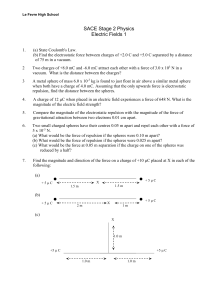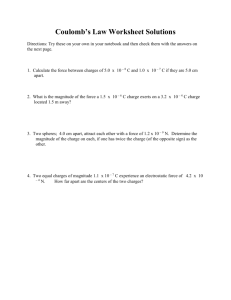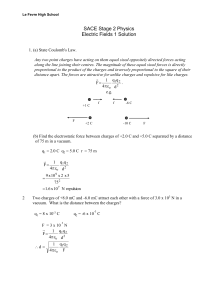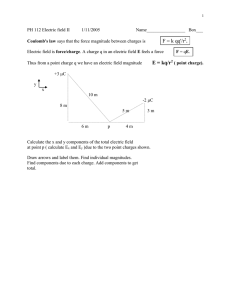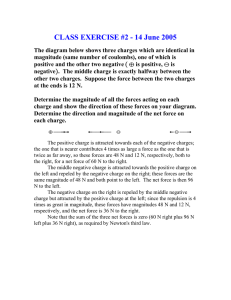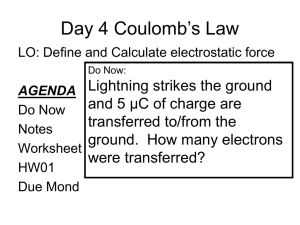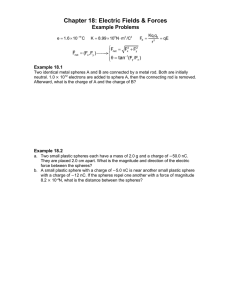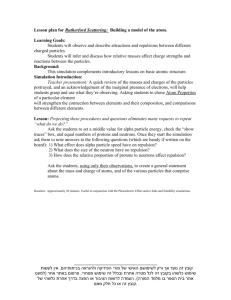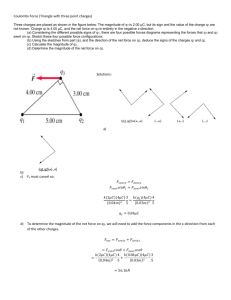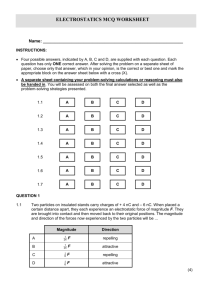Electric Fields 1 Solution
advertisement
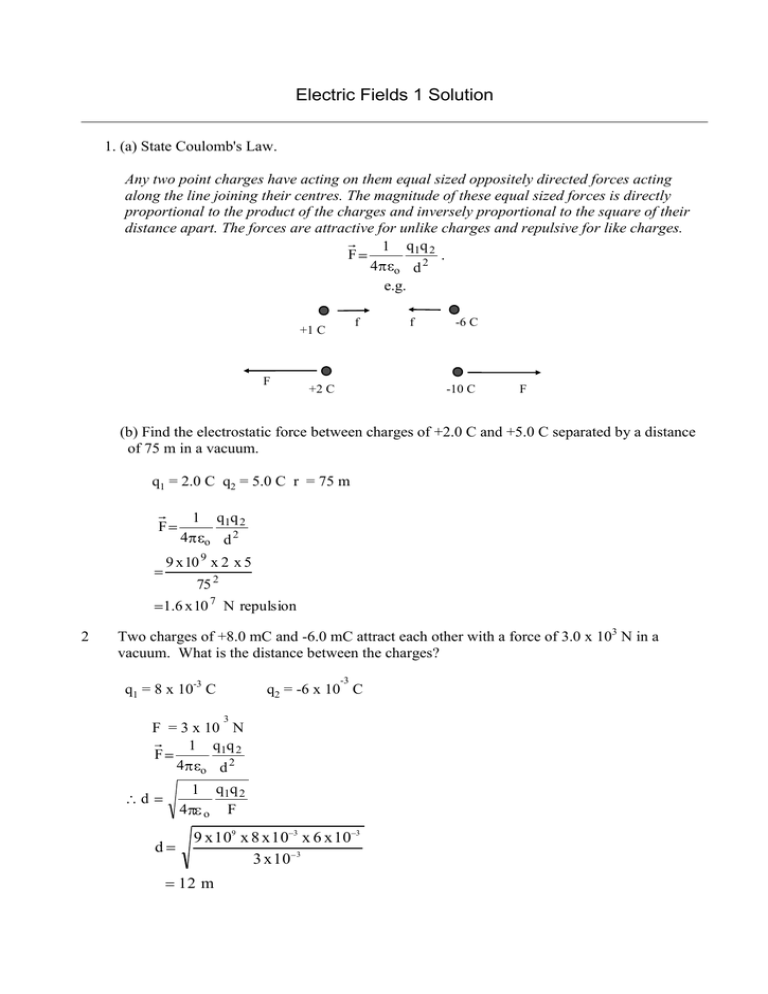
Electric Fields 1 Solution 1. (a) State Coulomb's Law. Any two point charges have acting on them equal sized oppositely directed forces acting along the line joining their centres. The magnitude of these equal sized forces is directly proportional to the product of the charges and inversely proportional to the square of their distance apart. The forces are attractive for unlike charges and repulsive for like charges. 1 q 1q 2 F . 4 o d2 e.g. f +1 C F +2 C f -6 C -10 C F (b) Find the electrostatic force between charges of +2.0 C and +5.0 C separated by a distance of 75 m in a vacuum. q1 = 2.0 C q2 = 5.0 C r = 75 m F q 1q 2 1 4 d2 o 9 9 x 10 x 2 x 5 75 2 1.6 x 10 7 N repulsion 2 Two charges of +8.0 mC and -6.0 mC attract each other with a force of 3.0 x 103 N in a vacuum. What is the distance between the charges? -3 q1 = 8 x 10-3 C q2 = -6 x 10 C 3 F = 3 x 10 N 1 q 1q 2 F 4 o d2 1 d 4 d o q1q 2 F 9 x 109 x 8 x 10 3 x 6 x 10 3 3 x 10 3 12 m 3 A metal sphere of mass 6.0 x 10-3 kg is found to just float in air above a similar metal sphere when both have a charge of 4.0 mC. Assuming that the only upwards force is electrostatic repulsion, find the distance between the spheres. M = 6.x 10-3 kg g = 9.8 ms-2 q1 = 4 mC q2 = 4 mC (Could both be + or - charges) F coulombic Forces acting have equal magnitudes, opposite directions + F gravity Fcoulombic = Fgravitational + Since the gravitaional force is equal and opposite to the coulombic 1 q 1q 2 = mg 4 o d2 1 d 4 o q1q 2 mg 9 x 109 x (4 x 10 3 ) 2 6 x 10 3 x 9.8 d 1.56 k m (This indicates how small the gravitational force is compared to the electrostatic!) 4. A charge of 12 C when placed in an electric field experiences a force of 648 N. What is the magnitude of the electric field strength? q = 12 mC F = 648 N E F q 648 12 x 10 6 E = 5.4 x 10 -7 N C -1 5. Compare the magnitude of the electrostatic repulsion with the magnitude of the force of gravitational attraction between two electrons 0.01 cm apart. Fgravitational G 9 x 109 x (1.6 x 10 me m e d 2 (0.01x 10 ) 5.54 x 10 63 1 4 ) 2 2 6.67 x 10 11 x (9.11 x 10 31 ) 2 (0.01 x 10 2 ) 2 Fcoulombic 19 2 o N attraction q1q 2 d2 2.3 x 10 20 N repulsion Fgravitational is extremely small and attractive Fcoulombic is much larger and repulsive. The point of this question is that in any dealings with electrons we can ignore gravitational forces as they are insignificant compared to electric forces. 6. Two small charged spheres have their centres 0.05 m apart and repel each other with a force of 5 x 10-5 N. (a) What would be the force of repulsion if the spheres were 0.10 m apart? r = 0.05 m F = 5 x 10-5 N repulsion. distance of separation increased to 0.10 m, i.e. doubled. 1 Since F ; q1 and q2 constant r2 then force of repulsion quartered 5 x10 5 4 F = 1.25 x 10-5 N repulsion. F (b) What would be the force of repulsion if the spheres were 0.025 m apart? Separation now 0.025 m i.e. halved, F quadrupled q1 , q2 the same. F' = 20 x 10 -5 N repulsion (c) What would be the force at 0.05 m separation if the charge on one of the spheres was reduced by a half? charge on of spheres halved q 1q 2 from F , q2 and r same r2 F is halved F = 2.5 x 10 -5 N repulsion. 7. What happens to the force between two charged metal spheres in a vacuum if the charge on each is doubled and the distance between them is multiplied by three? F F q 1q 2 1 4 d2 o q 1q 2 r2 F2 F2 each charge doubled, r is tripled 2 q1 x 2 q 2 (3r ) 2 4 F 9 ie. Force is decreased to 4 of original value 9 8. Find the magnitude and direction of the force on a charge of +10 C placed at X in each of the following: (a) +5 +5 X C C 1.5 m 1.5 m You must calculate the force on the +10 C charge due to each of the end charges (here called A and B ) separately. Then add the two together to get the resultant force. F FA = FB q 1q 2 1 4 o d2 9 x 10 9 x 5 x 10 6 x 10 x 10 (1.5 ) 2 0.2 N FB = 2 N x 6 FA = 2 N Fresult = 0 (b) +5 C FA = +5 X 2m 9 x 10 9 x 5 x 10 6 x 10 x 10 ( 2) 2 0.1125 N to the right 6 FB = 4 x 0.1125 N = 0.45 N to the left. [F FB = 0.45 N x C 1m FA = 0.1125 N F res = 0.3375 N to the left 1 d2 ]
